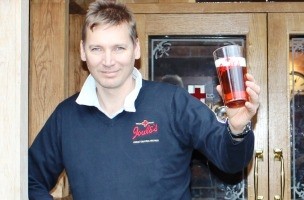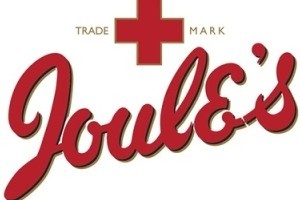The Big Interview: Steve Nuttall, Joule's Brewery

Wrapped around the inside walls of the brewer’s hall, a spacious new bar linking the 17th-century Red Lion in Market Drayton to the 21st-century Joule’s Brewery at the back, the splendid oak panelling is not just there for looks, it turns out.
Originally made for the Grattan’s boardroom (as in Grattan’s catalogue) in the 1930s, the legendary furniture-maker Robert ‘Mouseman’ Thompson carved into the wood, along with his signature mouse, a sleeping monk. This was Thompson’s little joke on the Grattan directors. The monk represents morality, snoozing through their money-driven decision-making.
Joule’s managing director Steve Nuttall bought the panelling and built his brewery tap around it “as a reminder of our values”, he says — the values of the monk, that is. “Do something worthwhile and the business will look after itself — and that’s working for us so far.”
If it wasn’t for the fact that he has hardly changed in appearance, it would be difficult to believe this is the same Steve Nuttall I first met 20 years ago when he was the most thrusting of thrusting young marketing men at Bass Brewers.
Nuttall is one of the few people who can claim to have created a whole new beer category when he came up with Caffrey’s Ale, inspiring a wave of nitro-keg brews in its wake.
In recognition, Bass offered him the role of brand director, but he wanted his own brand and instead led a management buy-out of the company’s Highgate Brewery, a near-forgotten Victorian edifice in the back streets of Walsall, West Midlands.
After putting the beer back on the map and establishing a small pub estate, Nuttall sold up and turned to a brand that had caught his eye while working on what Bass used to call dismissively the ‘ale tail’.
“It was dormant, but I always thought Joule’s was the best of them,” he says. “It had a terrific charisma, and that’s a great property. And the Joule’s script — you’d never design that.”
Nuttall also saw “many parallels” between Joule’s and the brand that overshadowed it in the portfolio — not to mention the world market — Bass Ale.
When Bass claimed trademark number one with its red triangle, Joule’s was close behind at number six with its red cross, a nod to the monks who came up with the recipe and still the only red cross that can legally be used by a commercial brand.
“Joule’s was the first British beer to be exported to the United States. Bass was the second. Joule’s actually had the bigger foothold in the US, and they were both on the bar of the Titanic. I believe Joule’s could have been as big as Bass.”
Big challenge
Nuttall eventually negotiated the rights to the Joule’s name in 2007 and put it at the head of the pub estate he was developing before starting work on a new brewery. Three years later, backed by the Co-op Bank and at a cost of £1.65m, Joule’s Pale Ale was again being brewed behind the Red Lion in Market Drayton, an original Joule’s pub sitting on the same geological seam and soft-water source as the Joule’s brewery demolished at nearby Stone, Staffordshire.
“It was a big challenge,” says Nuttall. “We knew we had to do something impressive to be worthy of turning a new chapter in the Joule’s story, or people would have rejected it. We had to be peculiarly local and share the same values — and get the pubs back if we could. Seven of the pubs we have now were old Joule’s pubs.”
To help match the new Joule’s Pale to the one that had been lost, head brewer Adam Goodall turned to the last man to have brewed it, Anthony Heeley. “It came down to Anthony to taste it and tell us it was right,” says Nuttall.
The branding was “stripped back to something very simple, something people could recognise and engage with”, and it’s selling well. “We can brew 200 barrels a week,” Nuttall adds.
While the freetrade is growing faster, two-thirds of the volume goes through the Joule’s tied estate, comprising 18 ‘brewery taps’ on franchise-style agreements and 12 traditional tenancies and leases.
“We’re looking for a solid base and a slow development,” says Nuttall. “It’s about being local. We want to have a meaningful relationship with customers. The aim is to reach 50 pubs. It’ll be a nice business by then and we can say the job’s been done.
“I’d like beer to be a local product again, to allow people to enjoy discovering cask ale when they travel,” he goes on. “I like the idea of islands of beer types and styles attached to a local demand, the return of regional variety. It’s more efficient, eco-friendly and fun. I don’t like every pub selling the same beers.”
It seems Nuttall is not just a good marketer. He designs and project-manages all the work on the Joule’s pub estate, and the Red Lion last year won a Campaign for Real Ale pub design award. “I have an idea and then make it up as I go along, really. It probably takes longer, but I love using recycled materials. Pubs should feel restored and get better with age.
“I used to think a good building would look after itself, but that’s only half of it,” he adds. “Pubs have got to have people working in them who want to do what we want to do — good pubs and good beer.”
Deep cynicism
Even then, Nuttall freely admits that “the pub trade has never struggled as much as it is now. We are having to broaden the offer to fulfil different needs.
“As a brewer, though, we can’t complain. Cask beer is back with a vengeance, and young people are coming back into the market. Caffrey’s was intended to be a cask beer in a more accessible form, but no-one has quite achieved that, so the good thing is that if you want cask you’ve got to go to the pub.
“We won’t sell bottled beers to supermarkets. You’ll only ever see Joule’s on cask. I always get a round of applause when I say we won’t deal with supermarkets. There’s a deep cynicism about them.”
Joule’s sells pork from the brewer’s own herd of pigs, by the way, lodged at the organic, community-owned, Fordhall Farm on the outskirts of Market Drayton.
“The horsemeat scandal was wonderful for us,” Nuttall goes on. “It shows the pursuit of profit alone to be inherently immoral. They had been turning a blind eye. They will always compromise on quality.”
He finds craft-keg beer to be an interesting development. “Brewers are coming up with a variety of beer types away from mainstream products, and we’ve got to be a part of that. The industry is becoming more niche, more specialist and less big business.
“What we’re heading for is a cacophony of smaller producers doing clever things. And we’re not half-way through that change. There’s no point for me in just being bigger. If we grow beyond a certain size, we’ll die. The bigger you get, the more inevitable the pressure to reduce costs.
“And we cannot make something cheaply without any compromise. The end result of that is horsemeat in beef. It’s an ugly business, but our model doesn’t force us in that direction.”
And what does he think the young, thrusting Steve Nuttall, marketing hero of ‘Britain’s biggest brewer’ — as Bass liked to call itself — think of that?
“I was younger and more naive in those days,” he shrugs, glancing across at the dozing monk.
Key dates
1779
Francis Joule establishes brewery in Stone, Staffordshire
1876
Shortly after Bass registers its red triangle as the first trademark, the Joule’s red cross is registered as trademark number six
1974
Brewery demolished after being acquired by Bass Charrington
1990
Steve Nuttall starts with Bass on the graduate training scheme and joins the marketing team
1994
As marketing manager, he creates Caffrey’s Ale
1995
Turns down brand director position to lead management buy-out of Highgate Brewery in Walsall
2000
Sells Highgate to Aston Manor Brewery and starts buying pubs
2007
Negotiates purchase of Joule’s beer brand from Molson Coors
2008
Sells 10 of the 15 pubs to fund brewery project
2010
New brewery opens in Market Drayton, Shropshire






